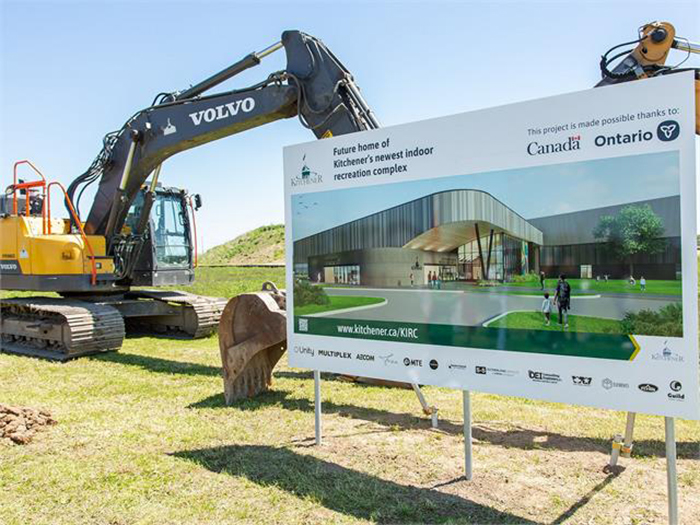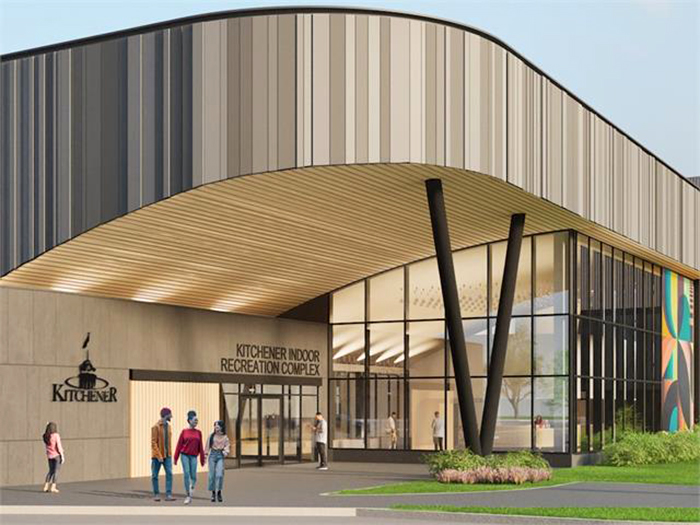Shovels are in the ground for a massive new, $144-million, multi-purpose indoor recreation facility at RBJ Schlegel Park on Huron Road in Kitchener, Ont. that will be the city’s first net-zero carbon building.
The 189,600-square-foot structure, designed by Unity Studio Design, will feature advanced geothermal heating and cooling systems and an array of rooftop solar panels, enabling the complex to reduce carbon emissions by 22 tonnes annually and save the city about $100,000 in utility costs each year.
It will be one of the most sustainable recreation facilities in Canada. The project is pursuing certification under the Canada Green Building Council Zero Carbon Building Standard v3 — Design, which is the highest level of certification for sustainable recreation facilities in the country.
The building is expected to open in 2026. It is the most expensive capital project ever undertaken in the city. The structure will have a FIFA-sized indoor turf field that can be divided into four individual fields to allow more residents to use the facility at the same time for sports such as soccer, cricket and lacrosse.
There will also be an aquatics centre with a community leisure pool and a separate lane pool with several viewing galleries, a second-floor walking track around the perimeter of the turf field, an indoor cricket batting cage, and a multi-purpose space with a large dividable room for community events.
The project was approved by Kitchener city council in April after receiving a staff and consultant’s report outlining the target cost and design. From 2019 to 2022, the city conducted substantial public and stakeholder engagement through interviews, workshops, feedback forms, focus groups and online surveys.
The federal government is investing $9.7 million in the project while the Government of Ontario is investing more than $8 million through the Investing in Canada Infrastructure Program. The remaining costs, or $126.2 million, will be funded through development charge revenues collected by the city.

In 2022, the budget for the project was estimated at $93 million, but the price tag grew significantly due to design changes, larger amenities and construction cost hikes. City staff are optimistic that the integrated project delivery (IPD) approach to the project will bring the complex in on time and on budget.
It is the first time the city has used the IPD approach, a new project delivery method by which key project participants responsible for the design, fabrication and construction components of the project are brought together early in the process to increase efficiency and identify savings. According to the city, approximately $7 million in savings was found using the approach.
General contractor on the project is Multiplex Canada. The company is working with civil/mechanical consultant AECOM Inc., structural contractor Walters Inc., electrical contractor Guild Electric Limited, envelope contractor Flynn, mechanical contractor Sutherland-Schultz, and cross-laminated timber company Element5 to deliver the project.
Walters Group said in a statement that the company is grateful to have been awarded the project with the responsibility of supplying, installing, and providing galvanized metal decking and various structural components for the complex.
“This project represents a significant step towards sustainability for the City of Kitchener and sets a precedent for future developments in Canada. Walters Group is honoured to contribute to such an innovative and eco-conscious project, marking a milestone in our commitment to sustainable building practices.”
The city envisions that as further government funding becomes available a future phase of the project will include indoor gymnasium space. The new facility is expected to welcome more than 380,000 people in its first year of operation and has been designed with significant landscaping and other outdoor amenities to help it fit in with existing RBJ Schlegel Park’s elements. Currently, the park has two outdoor soccer fields, a multi-purpose turf sports field, a cricket pitch, four outdoor courts, a splash pad, and play areas.
“Our community facilities are much-loved, but are significant contributors to greenhouse gas emissions,” Margaret Johnston, Ward 8 councillor and chair of the community and infrastructure services committee, said in a statement. “That’s why this new recreation facility is being designed as one of the most sustainable recreation facilities in all of Canada.”



Recent Comments
comments for this post are closed